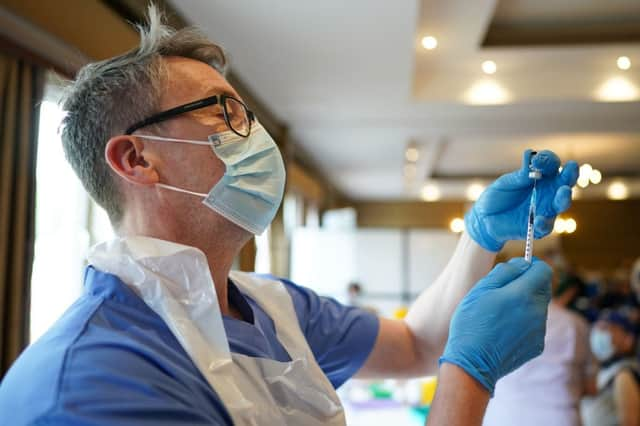Doctors warned to look for signs of stroke after AstraZeneca vaccine


Doctors are being urged to look for signs of a stroke in people who receive the AstraZeneca Covid-19 vaccine.
The warning comes after three young patients were admitted to hospital after their vaccination, and one sadly died.
Signs of ischaemic stroke
Advertisement
Hide AdAdvertisement
Hide AdHealth experts, including from the National Hospital for Neurology and Neurosurgery at University College London (UCL) Hospitals NHS Foundation Trust, told how two women in their 30s and a man in his 40s suffered blood clots in their large arteries, leading to ischaemic stroke.
The first patient, a 35-year-old Asian woman who later died, experienced an intermittent headache on the right side and around her eyes six days after having her vaccine.
Five days later, she woke feeling drowsy and with weakness to her face, arm and leg. She underwent brain surgery to try to reduce pressure in her skull alongside other treatments, but unfortunately these could not save her life.
The second patient, a white woman aged 37, suffered from headache, confusion, weakness in her left arm and loss of vision on the left side 12 days after her vaccine. She had several treatments and survived.
Advertisement
Hide AdAdvertisement
Hide AdThe third patient, an Asian man aged 43, was admitted to hospital three weeks after receiving his vaccination with problems speaking and understanding language. He received a platelet and plasma transfusion, plus other treatment, and remains stable.
While experts stressed the chances of suffering a stroke were small, the team has advised the NHS to look out for patients with signs of ischaemic stroke within around one month of vaccination.
Anyone who suffers any signs of a stroke should be “urgently evaluated” for a very rare syndrome called vaccine-induced thrombosis and thrombocytopenia (VITT).
This condition needs to be rapidly diagnosed and managed by a team with a range of expertise, who have quick access to a variety of drugs, the team said.
Advertisement
Hide AdAdvertisement
Hide AdHowever, cases of stroke are very rare and the condition is much more common in people who catch Covid-19.
Dr June Raine, Medicines and Healthcare products Regulatory Agency (MHRA) chief executive, explained: “As with any serious suspected adverse reaction, we will evaluate the reports of these extremely rare blood clots occurring together with low levels of platelets and will conduct full follow-up.
“We continually monitor the safety of Covid-19 vaccines and publish weekly an up-to-date summary of all the Yellow Card reports we have received.
“No effective medicine or vaccine is without risk. These specific kinds of blood clots with low platelets reported following Covid-19 Vaccine AstraZeneca remain extremely rare and unlikely to occur.
Advertisement
Hide AdAdvertisement
Hide Ad“Our advice remains that the benefits of the vaccine outweigh the risks in the majority of people.”
309 cases of major thrombosis
There have been 309 cases of major thrombosis with low platelet count suggesting VITT from more than 30 million doses of the AstraZeneca vaccine administered, according to the team.
As such, the number of people who experience blood clots from VITT after their Covid-19 vaccine is extremely low, at around just one per 100,000 doses.
Lead author of the report, David Werring, professor of clinical neurology at UCL, said: “Although cerebral venous thrombosis – an uncommon stroke type in clinical practice – is now recognised as being the most frequent presentation of VITT, our study shows that the much more common ischaemic stroke, due to arterial thrombosis blocking blood flow to part of the brain, may also be a presenting feature of vaccine-induced thrombosis.
Advertisement
Hide AdAdvertisement
Hide Ad“Of course, both types of thrombosis remain extremely rare, but doctors need to be vigilant if patients present with typical stroke symptoms, e.g. face, arm or leg weakness, or impaired speech, due to a blocked artery any time between days four and 28 post-vaccination.”
Other experts working on the report were from Sandwell and West Birmingham Hospitals NHS Trust and UCL’s Queen Square Institute of Neurology.
In a linked commentary, Professor Hugh Markus, from the department of clinical neurosciences, at the University of Cambridge, said: “During the current period of Covid vaccination, a high index of suspicion is required to identify thrombotic episodes following vaccination.
“However, it is important to remember that these side-effects are rare, and much less common than both cerebral venous thrombosis and ischaemic stroke associated with Covid-19 infection itself.”